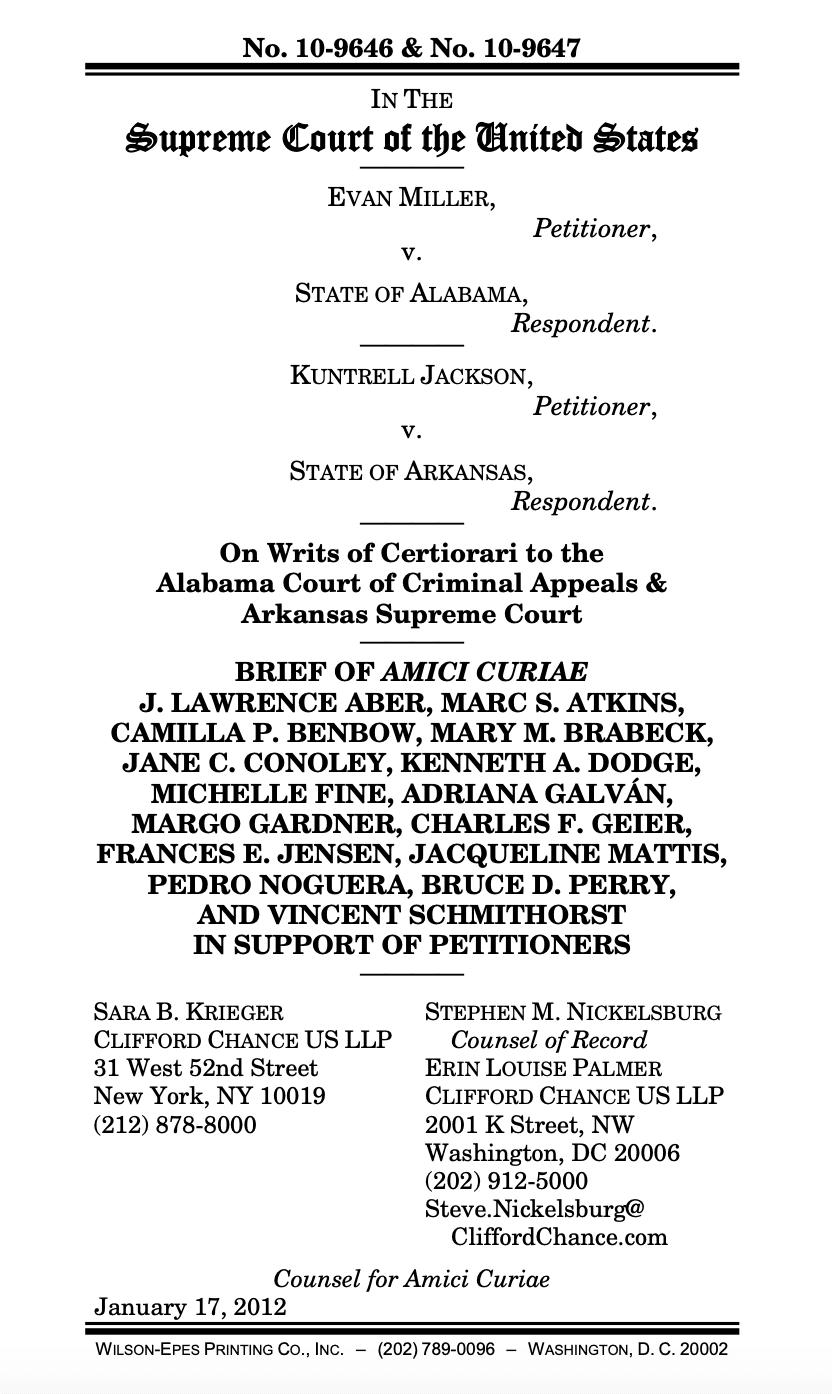
Summary of Argument
The Court acknowledged in Roper and reaffirmed in Graham that adolescent offenders are inherently "not as morally reprehensible as . . . adult" offenders, relying in part upon scientific study demonstrating that adolescents‘ neurological maturity and development are significantly different from those of adults. The body of scientific study has only deepened since those decisions and continues to confirm that compared with adults, the unique developmental characteristics of adolescents‘ brains lead to more impulsive behavior, the failure to comprehend consequences, and an underdeveloped sense of self, all of which may cause poor decisions and reckless actions. Adolescents also are particularly susceptible to negative environmental influences, which in turn may influence brain biology in a way that compounds the characteristics associated with their unique developmental stage. This distinction between the adolescent brain and the adult brain means that adolescent offenders are less culpable than adults and "cannot with reliability be classified among the worst of offenders". This is true regardless of the crime committed.
Based upon this immature capacity and "diminished culpability", the Court has held that the death penalty cannot be imposed on adolescents, "no matter how heinous the crime." For the same reasons, the Court has held that a sentence of life without parole, our "second most severe penalty", is unconstitutionally disproportionate for adolescents who commit non-homicide crimes without regard to their heinousness or depravity. The denial of all possibility of parole is particularly cruel in light of adolescents‘ unique capacity for change and rehabilitation, because a sentence of life without parole "gives no chance for fulfillment outside prison walls, no chance for reconciliation with society, no hope." Although Amici believe that adolescents can and should be held accountable for their actions, based on this logic, it is arbitrary and irrational to deny the possibility of parole solely to adolescent offenders whose crimes involved homicide.
This Brief focuses on the scientific and academic study post-Graham that confirms and extends our knowledge and understanding of adolescents‘ neurological, physiological, and psychological development. First, research continues to confirm that the process of adolescent brain development leads to greater vulnerabilities to high- sensation seeking behavior and less ability to fully comprehend consequences in comparison to adults. Recent studies have reinforced the conclusion that adolescents have a higher tendency to engage in risky behavior when faced with emotional or stressful situations. Environmental factors such as exposure to violence, peer influences, and availability of illegal substances only compound these deficiencies.
Second, ongoing research confirms that adolescents are highly amenable to rehabilitation and change. The very immaturity and plasticity that create an increased propensity for wrongdoing in adolescents also provide an enormous capacity for learning, development, and growth. Most adults understand and believe that the persons they were at age fourteen or fifteen are not the persons they are today. A sentence of life imprisonment without possibility of parole eliminates that opportunity forchange and "forswears altogether the rehabilitative ideal."
No penological goal is furthered by denying the possibility of parole to adolescents who receive life sentences. There is no retributive benefit to maximizing the punishment of the less culpable; and adolescents with underdeveloped rationality are unlikely to be deterred by losing the possibility of parole. At the same time, no legitimate interest is served by denying the prospect of rehabilitation to those most likely to respond to it, or by forever incapacitating those least likely to need it.
Third, to the extent one believes that some individuals even as adolescents are simply beyond hope (and Amici do not), our legal system is ill- equipped to identify those individuals at the time of trial. "[I]t is difficult even for expert psychologists to differentiate between the juvenile offender whose crime reflects unfortunate yet transient immaturity, and the rare juvenile offender whose crime reflects irreparable corruption." Even if courts had that ability, adolescents are far less capable of participating effectively in proceedings designed for adults, including by communicating with authority figures such as the police, judges, and their own counsel. Fundamental fairness does not countenance requiring adolescent defendants to prove the impossible, years in advance, in the adult legal system. To the contrary, fairness and decency require an opportunity to demonstrate, at some point in their lives, that crimes committed as a child do not reflect their true, developed characters and should not doom them to die behind bars.
In sum, the imposition of a sentence of life without parole on adolescents is inconsistent with scientific understanding of human growth, does not further legitimate penological purposes, and is fundamentally unfair. The Court so held in Graham for the adolescent who commits any non-homicide crime, which may include depraved and despicable acts such as maiming, raping, and torturing. It is equally true for crimes involving homicide. For these reasons, Amici respectfully submit that the judgments of the courts below should be reversed.